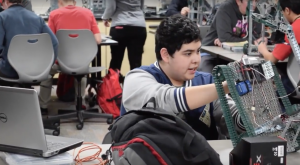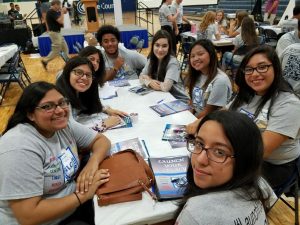New high school pilot program will track student mastery, skills
By Jean Lotus Staff reporter — April 10, 2017
A Huntley High School student adjusts his robot for a competition of the robotics team. (Photo courtesy of Huntley High School)
“How do you eat an elephant? — One bite at a time,” the saying goes.
When the elephant in the room is the high school education system in Illinois, breaking down student success into manageable bites is a project the Illinois State Board of Education wants to explore.
Ten Illinois school districts were selected April 3 in Peoria to participate in a new Competency-Based High School Graduation Requirements Pilot Program, part of the Post Secondary Workforce Readiness Act. State Superintendent Tony Smith kicked off the program with a meeting at Peoria District 150.
Competency education is a trend, relatively new to Illinois, breaking down classwork into mastery of a set of specific skills. The idea is to make it clear to students exactly what they need to know to get credit. The schools in the program will partner with a local community college and four-year university to keep students’ skills on track for success in college or careers.
“There’s evidence that the expectations of college and high school are disconnected, because of almost half of students who start at community colleges qualify for remedial courses,” said Marilyn Bellert, director of the Center for P-20 Engagement at Northern Illinois University. NIU will partner with several of the schools in the pilot program to give assistance and scope.
“We’re trying to increase students’ preparation for higher education and careers so that they’re enthused about high school and have a sense of direction,” Bellert said. “They need to learn what they need, so they go on to succeed. That would make a big change, especially in districts with high poverty levels.”
Breaking down classwork into a set of “standards” makes expectations more transparent and gives students control, administrators say.
“Standards-based grading empowers students to take ownership of their own learning,” said Jesse Rodriguez, superintendent of Proviso Township High School District 209 in suburban Cook County.
The 10 districts chosen represent a diverse mixture of urban and rural schools, small and large, as well as districts in high-performing wealthy areas and low-income, low-performing schools.
Chicago Public Schools will participate with six schools with a wide variety of student cohorts, including Whitney Young and Gwendolyn Brooks selective enrollment high schools, a math and science academy, neighborhood school Benito Juarez Community Academy, a special needs school and a high school for juveniles awaiting adjudication in Cook County Jail.
Part of competency learning addresses the fact that sometimes, students with weaker understanding of basic concepts fall behind and never catch up. The pilot program allows schools to “take seat-time off the table” said Proviso East High School Principal Patrick Hardy. Students are allowed to take the time necessary to master one skill before moving on. “So teachers are not saying, ‘The end of the semester is coming and I’ve got to give this kid a bad grade.’” A bad grade will act as “hope deterrence,” Hardy said. “It takes [the students’] hope away.”
Proviso East High School will launch the competency education model with all ninth-graders starting in the 2018-19 school year. The district’s other two high schools will launch their programs the following two years.
Participating schools get a waiver for state “seat time” requirements of the “Carnegie Unit” or 120 hours of instruction per year in one subject — around one hour per day five days a week for 24 weeks.
“Illinois is one of the states most behind in the concept of ‘seat time,’” said Principal Scott Rowe of Huntley High School in McHenry County.
Huntley has 2,880 students, with only 13 percent low-income. Most are on track academically when they begin, Rowe said. Junior and senior students in proposed 2018-19 pilot classes who have already mastered the standards for their grades can work in service projects with the community, Rowe said. The school has already created a “blended learning” option that allows one-third of the students to work independently online several days a week. “We want to attack the traditional education system so students can expedite their personalized learning goals.”
Rowe said a focus on mastery for each student working at their own pace ends the system of “tracking” students by achievement cohort. Critics of tracking say it can exacerbate the achievement gap for minority students when children are stuck in a “track” at an early age and lose opportunities. Huntley will partner with McHenry County Community College and NIU.
At District 116 Round Lake High School in Lake County, students have already been exposed to competency learning for five years, said Susan Center, assistant principal for curriculum and instruction.

Collaborative learning at Round Lake High School (Photo courtesy of Round Lake High School Facebook)
“We are focusing on a skills-based education for our students that’s a real-world authentic learning experience,” she said. With a student body that’s 70 percent low income, Center said the school has moved to grading on “rubrics” that show exactly what is required. The district has seen increased test scores and better student success since taking the competency-based learning approach, she said.
“A big part of competency-based education is being on time, being accountable, being productive and having good work habits,” Center said.
For students who haven’t got the foundational skills, the school has a system of second chances.
“When students don’t have mastery, they are given a second chance to work until they are at least proficient,” she said. This may involve double-length classes of math and reading for students who need it. “We call it ‘diagonal movement’ where some students can take longer to accomplish certain goals.” This kind of flexible scheduling isn’t possible without buy-in from the teachers’ union, she said.
“We have a fantastic union and members of our union love kids and believe in what’s best for kids. We work with the teachers, so it’s a team,” she said.
“We’re treating our students as young adults and giving them the freedoms they have earned,” Center added. The school is partnering with the College of Lake County and NIU.
At Peoria D150, the pilot project’s details are still in beginning stages, but Superintendent Sharon Desmoulin-Kherat is excited for the potential and sees a way to expand options at the district’s high school sites.
“The sky’s the limit,” she said. “This approach is all about the learning with some flexibility around the Carnegie units and graduation credits. Working at their own pace, I’m excited about the idea that students have a way to have relevance and personalized learning. It’s another way to present the high school experience.”
“Having flexibility with clock hours will allow students to participate in blended project-based experiences, work offsite in a professional setting and work directly with experts,” Desmoulin-Kherat said in a press release. “The CBE Pilot initiative is expected to engage students who might otherwise drop out or find school irrelevant.”
Peoria D150 will partner with Illinois Central College and Bradley University.
In East St. Louis SD 189, the program, phased in over three years, will be used for “learning recovery” and an “accelerator program,” according to the pilot plan submitted to the ISBE. The program will start in the district’s alternative high school and the career and technical education program at East St. Louis Senior High School.
“We believe our current community collaboratives, unique student demographics and academic momentum position us to be well-suited for piloting a competency-based high school graduation diploma,” the submitted plan said.
Other high school districts participating in the pilot program are Ridgewood High School District 234 in Norridge and Harwood Heights, Williamsfield CUSD 210, Rantoul Township High School D193 and Kankakee School District 111.
Each school in the pilot program must figure out how to turn the standards-based curriculum into a grading system for transcripts required for college applications, NIU’s Marilyn Bellert said. Some schools, such as Round Lake HS, have already developed weighted grade systems depending on the percentage of standards attained. Others are using research from other districts around the country to develop grade systems. Competency-based systems have been around for several in Iowa, Colorado and New Hampshire.
“Every local school district and community has to invent this locally,” said NIU’s Marilyn Bellert. “There are models that have worked in other areas they can follow, but they have to reach an agreement among themselves that teachers, students, parents can work with this [model]. It’s an innovation that will take getting used to.”
Read the current issue of the Cook County Chronicle
Free subscription to the digital edition of the Cook County Chronicle
— New high school pilot program will track student mastery, skills —








